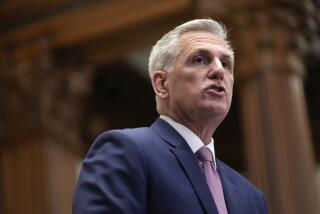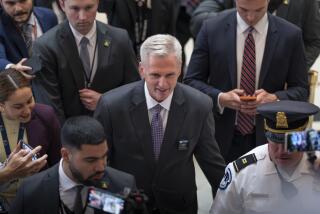For Democrats, Obama’s speech has unifying effect
WASHINGTON — A day after President Obama went to Capitol Hill to renew his call for a sweeping healthcare overhaul, Democrats on Thursday rallied behind him, giving important momentum to the push for legislation this year.
Especially important for the White House was the reaction of several conservative Democrats, who will be crucial to passing a bill that can clear the House and Senate. They cheered the president’s pledge to ensure that an overhaul would not add to the government’s debt.
“If the details live up to the quality of the speech, then it’s a good plan,” said Tennessee Rep. Jim Cooper, a conservative Democrat who has been critical of the healthcare bill developed by House leaders.
On the left, interest groups and lawmakers who recently have grown anxious about the fate of a proposed government-run insurance plan applauded Obama for forcefully endorsing the idea Wednesday night -- even though he said he was open to alternatives.
“The president last night spoke to the conscience of America,” said Rep. Barbara Lee (D-Oakland), one of the chamber’s most liberal members and head of the Congressional Black Caucus. “He talked about this being a moral imperative, an issue of social justice. And believe me, that resonated.”
Labor unions, which have bristled at proposals to tax high-value health plans like those provided under some union contracts, held their fire even as Obama suggested such an approach in his speech.
“I take the president at his word that he does not want to raise taxes on the middle class,” said Andy Stern, head of the Service Employees International Union.
And the liberal grass-roots powerhouse MoveOn.Org, which over the summer targeted numerous centrist Democrats, turned its fire Thursday on Rep. Joe Wilson, the South Carolina Republican who called Obama a liar during the president’s address.
Most Republican leaders, however, continued to criticize Obama’s healthcare plan.
“It sounded very much like the Chicago politics that I know he’s familiar with,” said Arizona Sen. Jon Kyl, the No. 2 Republican in the Senate. “It appeared as if he was trying to ram something through.”
Privately, however, some Republicans worried that the party’s unremitting opposition to the Democratic plans could boomerang in next year’s congressional elections -- especially if a far-reaching overhaul is approved.
To build on the positive effects of Obama’s speech, Democratic leaders must show swift progress in moving healthcare bills through the House and Senate.
But the president on Wednesday night did not settle some of the most contentious questions bedeviling the overhaul, including the fate of the public option and the details of any new taxes and fees that may be necessary to pay for a major expansion in coverage.
Nor did he succeed in smoothing out all the divisions within his party.
Underscoring tensions among Capitol Hill Democrats, House Ways and Means Committee Chairman Charles B. Rangel (D-N.Y.) -- a key architect of the House healthcare bill -- derided the Senate’s legislative effort.
“I wouldn’t spend a lot of time on what the Senate is thinking. They are not thinking, quite frankly,” Rangel said. “One thing we don’t have responsibility [for] is to check with the other body.”
Still, if Obama did not achieve total unity, he did make progress after weeks in which divisions between liberal and conservative Democrats had dominated the news.
Before the August recess, fiscally conservative Blue Dog Democrats in the House nearly blocked an important committee from advancing the party’s healthcare bill.
And in the Senate, liberal lawmakers had been fuming at efforts by Senate Finance Committee Chairman Max Baucus (D-Mont.) to craft a bill conservative enough to win substantial Republican support.
The effective end of Baucus’ push this week helped defuse some of that tension. But in his speech, Obama gave important rhetorical nods to both wings of his party.
For liberals, the president invoked the desires of the late Sen. Edward M. Kennedy (D-Mass.), who throughout his decades on Capitol Hill had pressed to remake the healthcare system. For more conservative lawmakers, Obama talked not just of fiscal responsibility, but emphasized the need for bipartisanship -- a crucial point for Democrats from states and districts full of Republicans and independents.
“He clearly and appropriately opened the door to negotiations with Republican members,” said Rep. Rick Boucher (D-Va.).
On Thursday, Obama and his budget director, Peter R. Orszag, met at the White House with 16 mostly centrist Democrats and one independent to press the case for action on healthcare and reassure them of his commitment to making any bill deficit neutral.
“We talked a lot about how we are going to pay for this,” said Sen. Mark Udall (D-Colo.), who attended the meeting. “And I think we are well on the way to finding the right mixture of mechanisms.”
Vice President Joe Biden traveled to the Capitol to meet with the Congressional Black Caucus, a key block of liberal votes. After the meeting, members of the caucus said Biden had reiterated the administration’s support for creating a government insurance option.
Senate Majority Leader Harry Reid (D-Nev.) and House Speaker Nancy Pelosi (D-San Francisco) also met with groups of Democratic lawmakers to help build consensus for action.
“The speech is just a beginning. It has to be followed up with more efforts by the White House to stress the importance of acting now,” said Rep. Adam B. Schiff (D-Burbank), a member of the Blue Dog caucus. “But we all hope this is a turning point.”
--
Richard Simon, Janet Hook and Peter Nicholas in the Washington bureau contributed to this report.
More to Read
Get the L.A. Times Politics newsletter
Deeply reported insights into legislation, politics and policy from Sacramento, Washington and beyond. In your inbox three times per week.
You may occasionally receive promotional content from the Los Angeles Times.











